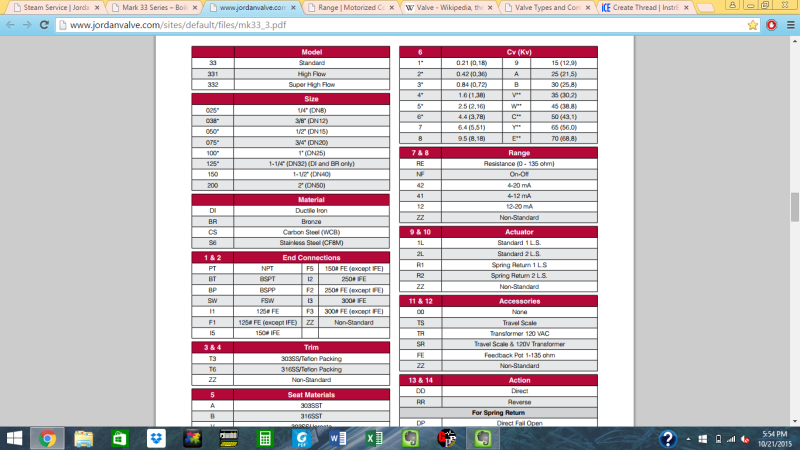Navigation
Install the app
How to install the app on iOS
Follow along with the video below to see how to install our site as a web app on your home screen.
Note: This feature may not be available in some browsers.
More options
-
Congratulations waross on being selected by the Tek-Tips community for having the most helpful posts in the forums last week. Way to Go!
You are using an out of date browser. It may not display this or other websites correctly.
You should upgrade or use an alternative browser.
You should upgrade or use an alternative browser.
Control valve specifications
- Thread starter franz03
- Start date
- Status
- Not open for further replies.
Hi,
Your question is very broad and multi-disciplinary. This should be dive in by yourself.
Valve selection handbook or similar is a good start.
Question:
Can someone explain to me the difference in the model, material, end connection, trim, seat materials and Cv. We will be using the control valve for steam regulation.
Short guidance (some also need verification from you):
a. Steam? What is steam? Acidic steam, pure steam, Low Pressure (LP) / MP / HP Steam. Does it contain H2S, etc.? What temperature?
Let say it contain H2S then it is subjected for NACE MR0175. Which means your internal /trim (wetted parts) have to comply with certain hardness level and corrosion resistance.
b. Material?
For internal, guidance as point a above. For body, bonnet at least same material as the pipeline.
c. (Steam) regulation? Please elaborate this: what are you regulating? Pressure / flow / Cv?
For general application Globe valve (due to its construction) is widely preferable.
Google also "control valve flow characteristic". Which one is suitable for your application (linear/quick opening/equal percentage). This will define the Plug model
d. End connection (threaded, Butt-weld, Socket weld, RF).
Preferably not to use threaded connection for Class 900 or above. And sizes bigger than 4"
I would suggest butt-weld over socket weld. For socket weld, normally (shall done by standard welding) will left a crevice in between which easily attacked by Steam--> thus Stress Corrosion Cracking (SCC).
Butt Weld vs RF is closely related to the body material selection; maintainability / interchangeability of the valve; and allowable leakage rate to environment (Butt weld minimize this possibility).
Hope I inform you sufficiently.
Regards,
All valves will last for years, except the ones that were poorly manufactured; are still wrongly operated and or were wrongly selected
Your question is very broad and multi-disciplinary. This should be dive in by yourself.
Valve selection handbook or similar is a good start.
Question:
Can someone explain to me the difference in the model, material, end connection, trim, seat materials and Cv. We will be using the control valve for steam regulation.
Short guidance (some also need verification from you):
a. Steam? What is steam? Acidic steam, pure steam, Low Pressure (LP) / MP / HP Steam. Does it contain H2S, etc.? What temperature?
Let say it contain H2S then it is subjected for NACE MR0175. Which means your internal /trim (wetted parts) have to comply with certain hardness level and corrosion resistance.
b. Material?
For internal, guidance as point a above. For body, bonnet at least same material as the pipeline.
c. (Steam) regulation? Please elaborate this: what are you regulating? Pressure / flow / Cv?
For general application Globe valve (due to its construction) is widely preferable.
Google also "control valve flow characteristic". Which one is suitable for your application (linear/quick opening/equal percentage). This will define the Plug model
d. End connection (threaded, Butt-weld, Socket weld, RF).
Preferably not to use threaded connection for Class 900 or above. And sizes bigger than 4"
I would suggest butt-weld over socket weld. For socket weld, normally (shall done by standard welding) will left a crevice in between which easily attacked by Steam--> thus Stress Corrosion Cracking (SCC).
Butt Weld vs RF is closely related to the body material selection; maintainability / interchangeability of the valve; and allowable leakage rate to environment (Butt weld minimize this possibility).
Hope I inform you sufficiently.
Regards,
All valves will last for years, except the ones that were poorly manufactured; are still wrongly operated and or were wrongly selected
- Status
- Not open for further replies.
Similar threads
- Replies
- 6
- Views
- 76
- Replies
- 5
- Views
- 53
- Replies
- 7
- Views
- 39

